Ray Westwood
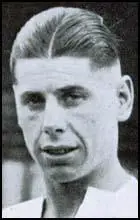
William (Ray) Westwood was born in Kingswinford on 14th April 1912. He played football for Sturbridge and Brierley Hill Alliance before joining Bolton Wanderers as a amateur in the summer of 1928.
After turning professional Westwood made his debut against Manchester City in March 1931. Bolton was a struggling First Division side at the time and finished 21st in the 1932-33 season and was relegated.
Westwood remained in good form and he won his first international cap for England against Wales on 29th September 1934. Also in the team that day was Ray Bowden, Jackie Bray, Cliff Britton, Eric Brook, Tom Cooper, Eddie Hapgood, Henry Hibbs, Stanley Matthews and Fred Tilson. England won the game 4-0.
In the 1934-35 season Bolton Wanderers finished as runners-up to Brentford in the Second Division and so won promotion to the top flight. That season Westwood scored 30 goals in 38 games, including four in the 8-0 home win over Barnsley.
Westwood won his second international cap for England against Scotland on 6th April 1935. England lost the game 2-0. Westwood also played against Holland (1-0), Northern Ireland (3-1) and Germany (3-0) that year.
Bolton Wanderers finished in 13th place in the 1935-36 season. That season he played his last international game for England against Wales. Although England won the game 2-1 Westwood once again failed to score for his country and lost his place to Cliff Bastin of Arsenal.
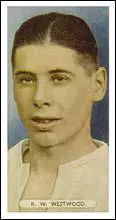
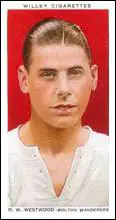
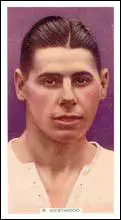
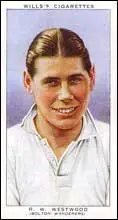
In the 1937-38 season Bolton Wanderers finished 7th place in the First Division. Westwood was top scorer with 23 goals in 33 league games. This included hat-tricks against Chelsea (5-5) and Grimsby Town (3-1). Nat Lofthouse, who was still at school at the time, watched Westwood play at Burnden Park: "He was an idol of mine. A brilliant player, who knew he was a good player, but wasn't big-headed. Over ten, fifteen, twenty yards he was electric. He mesmerised me as a boy, and I wanted to be like him."
Westwood was used by Brylcreem to model for their hair products on posters and printed advertisements. As the authors of Wartime Wanderers point out: "The immaculately groomed Westwood hairstyle with its razor-sharp centre parting was perfect for the Brylcreem image, and the manufacturers were quick to realise the powerful influence such an international footballer would have on the male population." He was paid five shillings (25 pence) for the use of his image on the advertising materials.
On 15th March, 1939, Adolf Hitler ordered the German Army to invade Czechoslovakia. It seemed that war was inevitable. On 8th April, Bolton Wanderers played a home game against Sunderland. Before the game started, Harry Goslin, the team captain, spoke to the crowd: "We are facing a national emergency. But this danger can be met, if everybody keeps a cool head, and knows what to do. This is something you can't leave to the other fellow, everybody has a share to do."
Of the 35 players on the staff of Bolton Wanderers, 32 joined the armed services and the other three went into the coal mines and munitions. This included Harry Hubbick, who resumed his career down the pits and Jack Atkinson and George Hunt served in the local police force. A total of 17 players, including Ray Westwood, Harry Goslin, Danny Winter, Billy Ithell, Albert Geldard, Tommy Sinclair, Don Howe, Ernie Forrest, Jackie Roberts, Jack Hurst and Stan Hanson, joined the 53rd (Bolton) Field Regiment.
On 12th May, 1940, Adolf Hitler ordered the invasion of France. The 53rd (Bolton) Field Regiment was sent to help the French but came under attack from the advancing Panzer divisions. Ray Westwood, Harry Goslin, Don Howe, Ernie Forrest, Jack Hurst and Stan Hanson, were lucky to make it back to the French port of Dunkirk where they were rescued by British ships.
The 53rd (Bolton) Field Regiment spent the rest of 1940 and the whole of 1941 at various army camps around Britain. According to the authors of Wartime Wanderers: They spent their time "building coastal defence constructions, manning anti-aircraft batteries and patrolling potential enemy landing sites all along the East Anglia coastline, variously stationed at Beccles, Nancton and Holt." This enabled them to play the occasional game for Bolton Wanderers in the North-East League. The team that year included Harry Hubbick, Jack Atkinson, George Hunt, Danny Winter, Billy Ithell, Walter Sidebottom, Albert Geldard, Tommy Sinclair, Don Howe, Ray Westwood, Ernie Forrest, Jackie Roberts, Jack Hurst and Stan Hanson.
On 15th July 1942, the 53rd (Bolton) Field Regiment was told to mobilise for overseas service. The following month they arrived in Egypt and immediately became involved in defending Alam el Halfa. On 30th August, 1942, General Erwin Rommel attacked Alam el Halfa but was repulsed by the Eighth Army. General Bernard Montgomery responded to this attack by ordering his troops to reinforce the defensive line from the coast to the impassable Qattara Depression. Montgomery was now able to make sure that Rommel and the German Army was unable to make any further advances into Egypt.
On 22nd October 1942, the 53rd (Bolton) Field Regiment took up battle positions. The following day General Bernard Montgomery launched Operation Lightfoot with the largest artillery bombardment since the First World War. The attack came at the worst time for the Deutsches Afrika Korps as Erwin Rommel was on sick leave in Austria. His replacement, General George Stumme, died of a heart-attack the day after the 900 gun bombardment of the German lines. Stume was replaced by General Ritter von Thoma and Adolf Hitler phoned Rommel to order him to return to Egypt immediately.
The Germans defended their positions well and after two days the Eighth Army had made little progress and Bernard Montgomery ordered an end to the attack. When Erwin Rommel returned he launched a counterattack at Kidney Depression (27th October). Montgomery now returned to the offensive and the 9th Australian Division created a salient in the enemy positions.
Winston Churchill was disappointed by the Eighth Army's lack of success and accused Montgomery of fighting a "half-hearted" battle. Montgomery ignored these criticisms and instead made plans for a new offensive, Operation Supercharge.
On 1st November 1942, Montgomery launched an attack on the Deutsches Afrika Korps at Kidney Ridge. After initially resisting the attack, Rommel decided he no longer had the resources to hold his line and on the 3rd November he ordered his troops to withdraw. However, Adolf Hitler overruled his commander and the Germans were forced to stand and fight.
The next day Montgomery ordered his men forward. Lieutenant Harry Goslin and the 53rd (Bolton) Field Regiment joined the pursuit. The Eighth Army broke through the German lines and Erwin Rommel, in danger of being surrounded, was forced to retreat. Those soldiers on foot, including large numbers of Italian soldiers, were unable to move fast enough and were taken prisoner.
The British Army recaptured Tobruk on 12th November, 1942. During the El Alamein campaign half of Rommel's 100,000 man army was killed, wounded or taken prisoner. He also lost over 450 tanks and 1,000 guns. The British and Commonwealth forces suffered 13,500 casualties and 500 of their tanks were damaged. However, of these, 350 were repaired and were able to take part in future battles. During this period Westwood missed most of the action as he worked as the driver for his commanding officer.
After spending time in Baghdad, the 53rd (Bolton) Field Regimentmoved to Kirkurk on 8th January 1943. They were eventually relocated to Kifri which was to become their main base for the next five months.
The 53rd (Bolton) Field Regiment joined General Bernard Montgomery and the 8th Army in the invasion of Italy. On 24th September, 1943, Lieutenant Harry Goslin and his men landed at Taranto. Three days later the men had reached Foggia without too much opposition. However, when the men were ordered to cross the River Sangro the regiment took part in some of the most difficult fighting of the Second World War.
At the end of November Don Howe was wounded and evacuated to a dressing station. After another enemy air attack Ray Westwood and Stan Hanson came close to being killed. The shelling continued and on 14th December, 1943, Harry Goslin was hit in the back by shrapnel. He died from his wounds a few days later. The Bolton Evening News reported: "Harry Goslin was one of the finest types professional football breeds. Not only in the personal sense, but for the club's sake, and the game's sake. I regret his life has had to be sacrificed in the cause of war."
What was left of the 53rd (Bolton) Field Regimentmoved to Monte Cairo, five miles north-west of Monte Cassino, on the main road from Naples to Rome. The Allied Commander-in-Chief, General Harold Alexander, told his men: "Throughout the past winter you have fought hard and valiantly... tomorrow we can see victory ahead. We are going to destroy the German armies inItaly." On 11th May 1944 the great British artillery programme bagan. Ernie Forrest and Jack Hurst, like many of the men serving in the artillery, began to suffer hearing loss because of the noise of this bombardment.
Jackie Roberts was caught in the blast of an enemy shell and had taken heavy shrapnel in the face, detaching the retina, and was immediately invalidated out of Italy and returned to Bolton. However, most of the Bolton players in the 53rd Field Regimentcontinued in the advance on Rome. Westwood, had an accident with a truck jack that left him concussed. He was sent back to a transit camp at Naples where he developed pneumonia.
Westwood continued to play for Bolton Wanderers after the Second World War. By the time he left in 1947 to join Chester City he had scored 128 goals in 304 games. After retiring from football in 1948 he worked as a newsagent in Brierley Hill.
Ray Westwood died in 1982.
